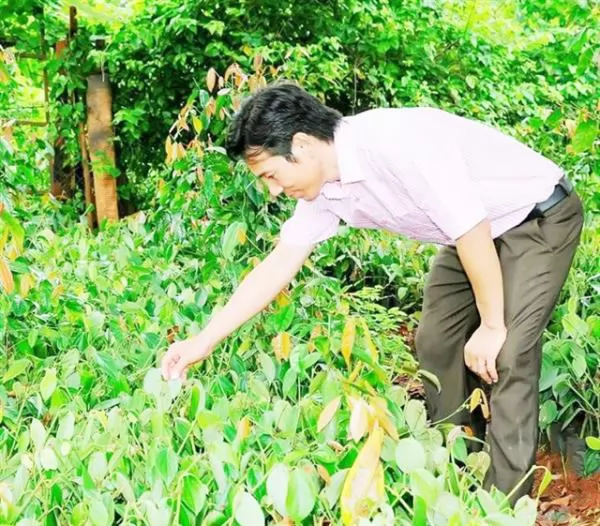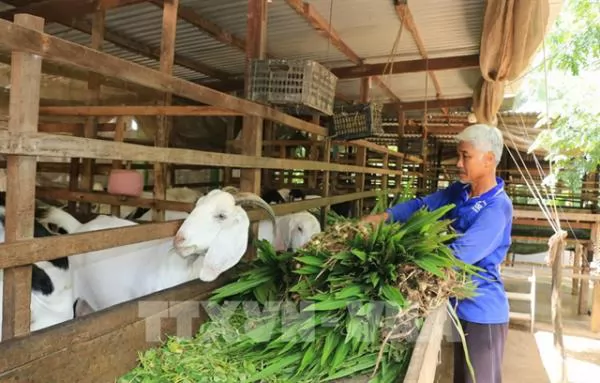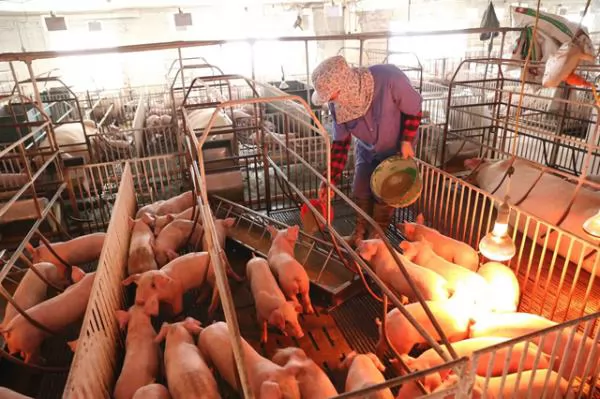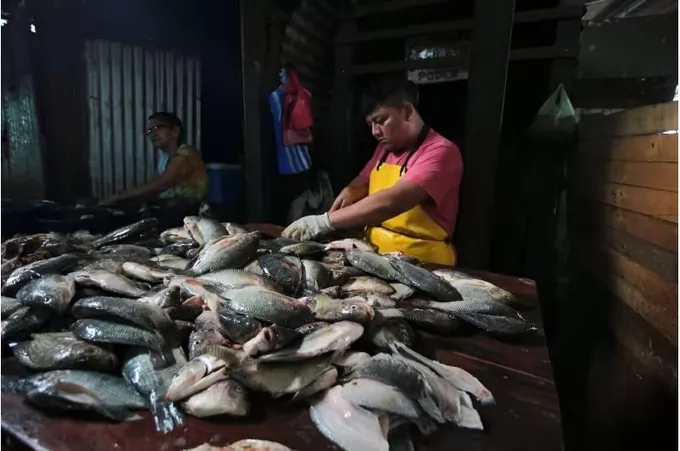Farmer brings Bầu Mây pepper abroad

Lâm Ngọc Nhâm takes care of the pepper garden. VNA/VNS Photo
BÀ RỊA-VŨNG TÀU - After leaving his hometown in the northern mountainous province of Tuyên Quang, Lâm Ngọc Nhâm settled in Bà Rịa - Vũng Tàu Province and established Bầu Mây Tourism Agriculture Trade Co-operative, a pepper farm that has enriched his family.
The co-operative in Xuyên Mộc District’s Hòa Hiệp Commune began growing 15ha of pepper under global good agricultural practices (GobalGAP) standards in 2015 and received GobalGAP certification four years later.
Nhâm said: “I have gone through many hardships to start a business in a strange land but with the desire and perseverance, have built Bầu Mây co-operative to become a supplier of pepper to high-quality demanding markets such as Japan, Dubai and the US.”
“We have grown many types of trees such as coffee, cashew, rambutan, durian, longan and jackfruit. But the yield is not high while the price is unstable," he said.
“Therefore, I am always thinking about how to find a plant, bringing stability for the family’s economy," he added.
He found that Bà Rịa - Vũng Tàu Province has a stable climate and suitable soil for pepper. He decided to plant many different varieties of pepper in his family’s garden.
“I was fortunate to discover a suitable variety of pepper in the garden, every year it produces high yield and develops well.”
He said this pepper variety has a taproot 10 times bigger than other varieties, is drought-resistant, has good disease resistance, and the yield reaches 10-12 tonnes per hectare.
In 2014, he started to expand the cultivation of this pepper variety.
He regularly visited the district’s Farmers' Association and the Southern Institute of Agricultural Sciences to learn experiences, participated in training courses on agricultural extension, and applied advanced technology.
In 2015, he named this variety Bầu Mây pepper and registered for a trademark at the National Office of Intellectual Property of Việt Nam.
With GobalGAP-quality pepper, Bầu Mây has developed traceability stamps for its pepper and pepper products to boost sales at home and abroad.
Last year the co-operative exported more than 100 tonnes of pepper and pepper products to many markets such as the EU, Japan, South Korea, China and the US.
The cultivation of pepper under GlobalGAP standards with traceability stamps have improved the competitiveness of the co-operative’s pepper products at home and abroad.
Bầu Mây now grows more than 30ha of pepper and produces about 200 tonnes of pepper and pepper products a year.
Nhâm won the second prize of the province’s Innovation Entrepreneurship Contest in 2017 for his initiative 'Controlling pepper flowering as desired'.
This solution has helped farmers adjust the flowering pepper as desired and combat diseases in the rainy season, limit fungi harmful to pepper, prevent erosion and soil degradation and at the same time, save irrigation water and reduce evaporation in the dry season, helping increase yield and the quality of pepper.
In addition, his model of planting pepper intercropped with củ mài (a tree that grows wildly in mountainous regions) has helped the pepper trees grow sustainably.
"In 2019, I planted 200 hectares of củ mài in alternating planting pepper, with the yield of 10,000 tonnes, earning billions of đồng," said Nhâm.
He also supported 10 local households to develop pepper productivity by providing fertiliser, seedlings and instructed them on technology.VNS
Maybe you are interested

Goats pull Đồng Tháp Province farmers out of poverty
Breeding goats has helped many farmers in the Cửu Long (Mekong) Delta province of Đồng Tháp escape poverty and earn a steady income since the animal is easy and inexpensive to raise.

Hà Nội needs to accelerate farm economy
HÀ NỘI - Hà Nội's farm economy in suburban districts has developed well in both quantity and quality with high turnover and creating jobs for thousands of workers in recent years.

Aquaculture overtakes wild fisheries for first time: UN report
Aquaculture is playing an increasingly important role in meeting the world's food needs, surpassing wild fisheries in aquatic animal production for the first time, according to a report published Friday.





